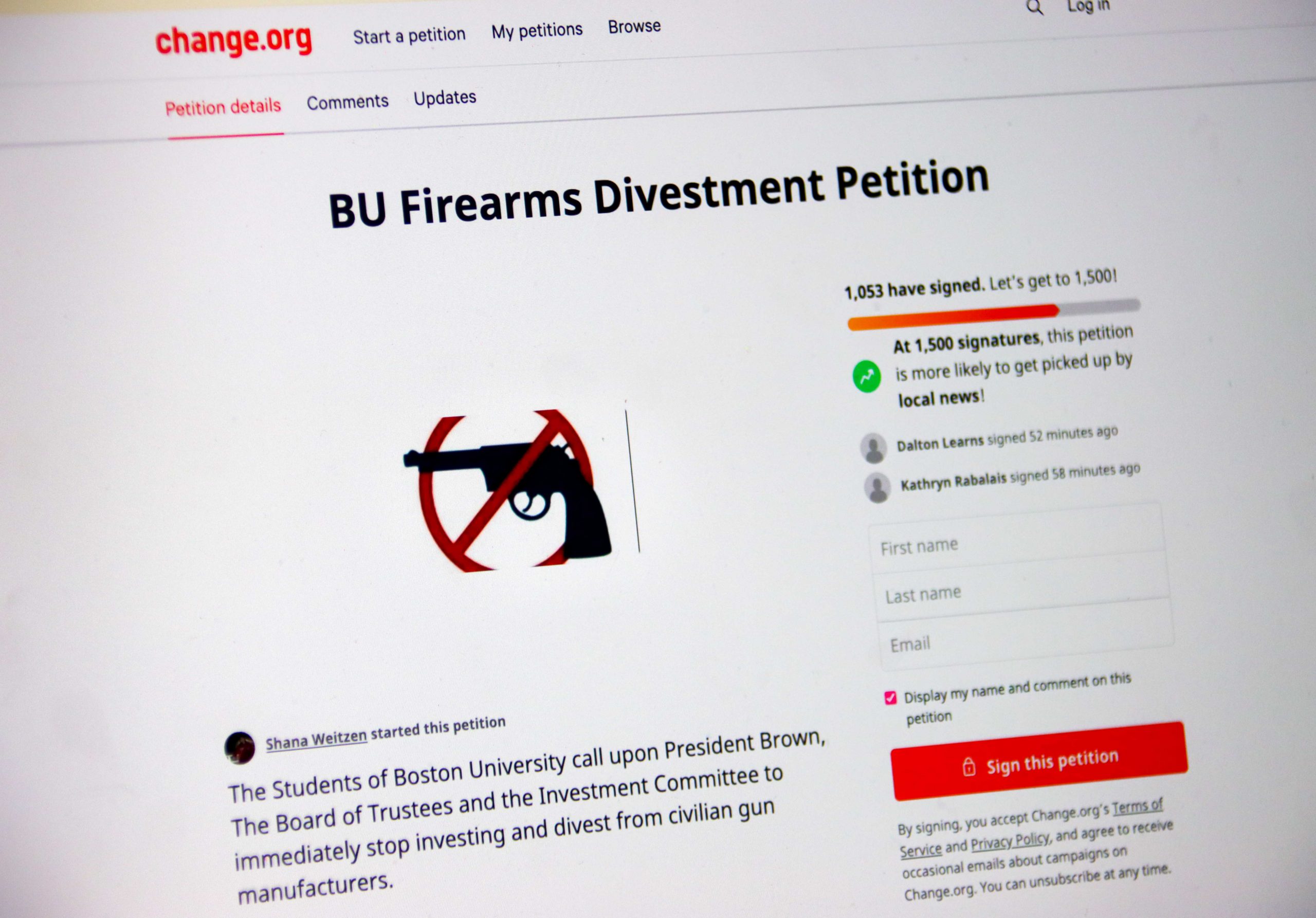
Boston University’s Advisory Committee for Socially Responsible Investing, which researches and makes investment recommendations to the University’s Board of Trustees, will review a proposal to have the University divest from the civilian firearms industry, according to an email from the committee’s chair.
The decision to review the proposal was spurred by a Change.org petition launched by a student last week, wrote Richard Reidy, ACSRI chair and vice chair of the Board of Trustees, in an email to Shana Weitzen, who organized the petition.
Weitzen said she started the petition after the recent shooting at Robb Elementary School in Uvalde, Texas, which claimed the lives of 19 children and two teachers. It was the University’s final decision in 2014 which spurred her to action, she added.
“A lot of us are so proud to be BU students, but this is something that makes that really difficult,” said Weitzen, a rising sophomore in the College of Arts and Sciences and the Frederick S. Pardee Pardee School of Global Studies.
More substantial discussion will take place during the 2022 Fall semester, Reidy wrote to Weitzen, once the committee appoints or reaffirms its three student representatives.
“In the meantime, the University’s President [Robert Brown] has permitted me to let you know that BU currently has no investments in civilian gun manufacturers,” Reidy wrote.
The issue was initially brought to the attention of University leadership in 2012 following the Sandy Hook Elementary School shooting, which claimed the lives of 20 children and six school staff. The ASCRI underwent a thorough review of a range of issues relating to BU’s investment in civilian gun manufacturers.
After a full academic year of deliberations, the committee recommended in May 2014 that the Board of Trustees “prohibit new and divest any existing direct investments in civilian firearms manufacturers” until BU judges that level federal or state regulations merit its repeal.
Months later, the Board of Trustees elected to reject the committee’s proposal, the reasoning being that by choosing to divest, BU would have appeared to be adopting a single viewpoint, and would undermine its goal of encouraging freedom of inquiry and debate, according to a memorandum by former Board Chair Richard Knox published.
“The discussion was about what our standards for that should be,” President Brown told BU Today at the time. “And the answer is, ‘Not never, but it’s a very high bar.’”
BU spokesperson Colin Riley declined to comment on the petition.
Though BU has already made a decision on this issue in the past, it’s not unheard of for the ACSRI to review issues again, nor for the Board of Trustees to reconsider previous decisions in light of new research — the committee recommended BU divest from fossil fuels twice prior to the school announcing its total divestment in October 2021.
At the time, President Brown told BU Today that the role many activists had played was “very influential” in the Board’s final decision.
Information on which specific corporations or entities BU invests in are not publicly available, given the university’s private status. In public tax forms, BU reported it held approximately $7.2 million in assets in 2020 — over $3 million of those were in short and long-term investments. It also reported a $3.4 billion endowment in 2021.
Though the issue of guns hasn’t been touched since 2014, former ACSRI committee member J. Robb Dixon, associate professor emeritus of Operations and Technology Management, wrote in an email that “sufficient time has passed, and enough has happened” for the committee to look at the divestment from civilian firearms again.
“What recommendations they make will depend entirely on the facts of the case and whether they meet the screening criteria for divestment,” Dixon wrote, adding he has not seen the petition nor spoken with any current members of the committee about it.
The ACSRI and the Board of Trustees can take upwards of a year in deliberating, reviewing, and deciding on investment issues, as has been in the past. For the Board of Trustees to ultimately adopt any proposal, there needs to be an “overwhelming consensus” among its members.
“Enough people have died,” Weitzen said “I don’t think it’s something that the school should want to stand behind.”























































































































